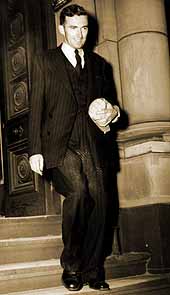 Power Without Glory is 660 pages long and consists of 14 chapters. Hardy prefaces each chapter with a quote. The quote from Samuel Johnson that begins chapter 13 probably sums up the moral of Power Without Glory: ‘Wealth keeps out only one of life’s evils, and that is poverty.’ Ah, how true. Ninety-nine percent of the population believe that money will solve all their problems, yet it can only alleviate poverty.
Power Without Glory is 660 pages long and consists of 14 chapters. Hardy prefaces each chapter with a quote. The quote from Samuel Johnson that begins chapter 13 probably sums up the moral of Power Without Glory: ‘Wealth keeps out only one of life’s evils, and that is poverty.’ Ah, how true. Ninety-nine percent of the population believe that money will solve all their problems, yet it can only alleviate poverty.I can’t figure out if I liked Power Without Glory, and I guess if you can’t figure out if you like something, it more than likely means you don’t. Nor can I decide whether it really is literature, but I’ve probably come to say that only because I know how the novel was put together. It was virtually commissioned by the Australian Communist Party. Even the idea for the novel was suggested to the author. Hardy also had members of the Communist Party working as researchers, gathering material on the Melbourne business identity on which the novel is based, John Wren. The book was virtually written by committee. Maybe that’s a little unjust. Nevertheless, you wonder what George Orwell would make of a novel gestated in this manner.
Hardy wrote the novel with the express aim of exposing how corrupted the Labor Party was by the likes of John Wren. The novel goes over in minute detail all of John Wren/West’s business dealings and influence over the Victorian State Labor Party. Fifty-five years after the book’s initial publication, the reader still staggers at the level of downright criminal activity that was going on under the Labor Party’s nose. Intrigue is piled upon intrigue. And it doesn’t end, continuing right up to the last page.
Interspersed with all the corruption is the West's miserable family life. The wife, Nellie, goes off and has an affair, gets pregnant to a builder and has a son. Then she is relegated off to another part of the house to atone for her sins. A son suicides. A daughter runs off to Europe after becoming a communist. And so on and so forth.
The novel itself reads pretty much like blockbuster fiction. It doesn’t really have a recognisable style. There are sections which are pretty shoddily written. The main character, John West, is pretty lifeless. You won’t find a grand villian, like Shakespeare’s Iago or Christopher Marlowe’s wonderful Jew of Malta, Barabas. It’s all that he does that gives him his character. The workings of his internal character we don’t see much of. He ends up a hypocondriac, a failure and a lonely man. As I was reading it I kept of thinking of Australia’s richest man, Kerry Packer. Does he see himself as a loser, I wonder, as he throws away millions at European gambling tables?
Novels usually have some sort of internal logic. Art, as Shakespeare said, holds a mirror up to reality, transporting reality into a world of imagery. Power Without Glory has no great images or characters. It’s an almost banal cataloguing of one man’s corrupt business dealings.
Just to weave some more biographical detail into this novel, it’s also interesting to note how Frank Hardy ended up himself addicted to gambling, just how John West rose to prominence. It’s ironic that this book set out to lift the veil on the corrupt practices of John Wren’s gambling businesses, yet Frank Hardy in later years became a hopeless gambler himself. A victim of the moneyed interests of people like John Wren.
Hmmm. I’m a bit iffy on Power Without Glory. This is a novel almost devoid of any type of aesthetic. Maybe it’s not a good idea to read novels written by Communists.
No comments:
Post a Comment